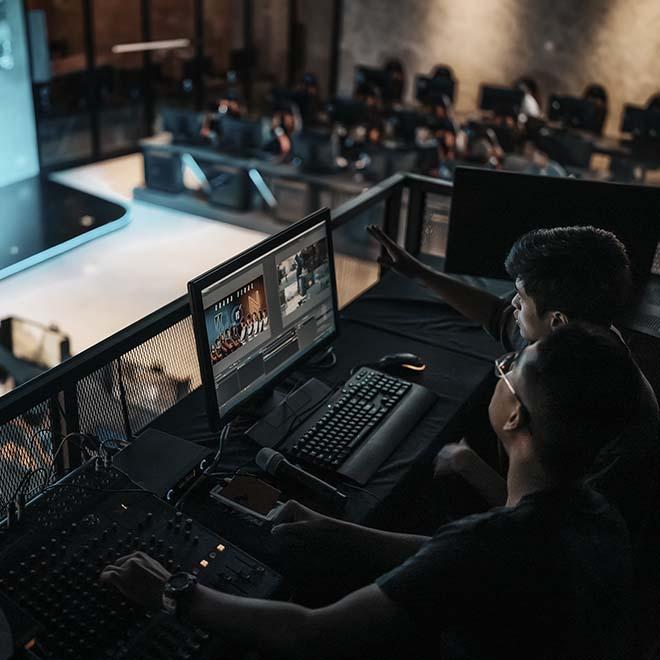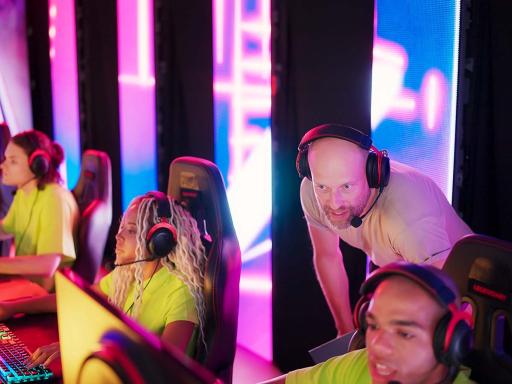Take ESPT-110.
Summer term B begins. Apply by June 19.
Fall term A begins. Apply by Aug. 21.
Fall term B begins. Apply by Oct. 16.
Explore Esports Management
The global esports industry is thriving, and the demand for skilled professionals who know how to navigate the business and operations side of competitive esports continues to grow. Current esports organizations and businesses that are looking to enter the industry seek individuals with an in-depth understanding of the unique challenges and opportunities presented by the esports industry. This program's specialized education will give graduates a competitive advantage in the job market. Graduates of the online Esports Management program will be equipped to analyze trends, understand player and audience needs, and create ethically-grounded strategies for successful esports teams, events, and organizations in the thriving esports market.
Finish your program faster with credit for prior learning and experience.
Differentiate your degree and get your resume noticed with an added certificate. Speak with an advisor for information.
Build Your Career Future
In an industry as dynamic and fast-growing as esports, effective management is crucial for sustainability and success. Esports management professionals provide the framework for teams and events to thrive, from securing sponsorships to optimizing player performance. As the industry matures, the demand for specialized skills in esports management is expected to rise, marking it as an essential aspect of the esports ecosystem. Prepare for a career in esports with our online degree in esports management and level up your knowledge and skills in this highly specialized bachelor’s degree program.
Program Curriculum
Champlain College Online combines the best practices of online education with the college's long standing expertise in game development. Champlain College's existing esports program provides a living laboratory where students can engage in practical, hands-on experiences, even from a distance. CCO students also have the opportunity to play on Champlain’s award winning esports teams.
Champlain's online esports management courses encompass the top skills needed by esports professionals. Graduates of the program are required to complete the following courses.
Esports Core (15 Credits)
Marketing Requirements (21 credits)
Digital Media Requirements (9 credits)
Business and Project Management Requirements (15 credits)
Capstone (3 credits)
General Education Courses (42 Credits)
General Electives (15 Credits)
This course offers an overview of esports' history, evolution, and current trends, emphasizing its ties to traditional sports and the wider entertainment industry. Students will delve into aspects of esports management such as team coordination, event planning, marketing, branding, and media relations. By the course's conclusion, students will possess a thorough grasp of the esports ecosystem, equipped to apply management principles in areas like team leadership and business growth.
Legal and ethical adherence is vital in esports. In this course, students delve into the legal frameworks such as contracts and intellectual property, coupled with ethical issues like fair play and player welfare in esports. With an emphasis on best practices, students will learn to integrate integrity and compliance into esports management. The course also highlights the evolving legal landscape in esports. By the end of the course, students will be equipped to ensure both legal and ethical adherence in esports ventures.
Prerequisites
In the rapidly evolving world of esports, the ability to build and manage a successful team is a skill that combines knowledge of gaming culture, business acumen, and leadership. This advanced course, designed for students with a foundational understanding of the esports industry, delves deep into the nuances of creating and sustaining a competitive esports team.
Prerequisites
Take ESPT-110.
This course examines how to conceptualize, plan, and execute successful in-person and virtual esports events. Students will evaluate industry best practices, explore creative audience engagement strategies, and investigate technologies that transform viewer experiences. Through hands-on projects, students will develop immersive event plans that captivate target audiences, anticipate operational challenges, address legal and ethical considerations, and incorporate strategic success measures, demonstrating versatile event management skills applicable across the entertainment industry.
Prerequisites
Take ESPT-110.
This course dives deep into the world of brand collaborations within the esports realm. Students will discover the intricacies of forging win-win partnerships, navigating contractual elements, and crafting compelling campaigns that resonate with the esports audience. By analyzing successful case studies and hands-on projects, participants will acquire the skills to effectively broker, design, and optimize sponsorship deals, ensuring mutual growth and brand enhancement. This course is a gateway to mastering the commercial side of the booming esports industry.
Prerequisites
Take ESPT-110
This course introduces the core terminology and principles of marketing. Students learn about the marketing mix (product, price, place, and promotion), market segmentation, and how external factors such as the economy, technology, culture, and competition influence marketing decisions. The course also examines how marketing fits within an organization and contributes to business success, along with how ethical considerations, cultural awareness, global trends, and social responsibility shape marketing practices across industries. No prior business experience is required.
This course explores the psychological and behavioral factors that influence consumer decision-making. Through a combination of theoretical and applied approaches, students will examine how individuals acquire, process, and use information to make purchasing decisions. Topics include the impact of social and cultural factors on consumer behavior, the role of emotions in decision-making, and the effects of marketing and advertising on consumer choices. Students will apply their knowledge of consumer behavior to the development of buyer personas for an organization.
Prerequisites
Complete MKTG-115
Focuses on the field of public information and public relations, with an emphasis on applying the appropriate theories and techniques to solve organizational and institutional communications problems.
Prerequisites
MKTG 200
This course will provide an overview of digital marketing strategies and techniques for organizations operating in a digital environment. Students will learn about consumer behavior in digital spaces as well as tactics including search engine optimization (SEO), pay-per-click (PPC) advertising, email marketing, social media and content marketing and analytics. Students will apply what they learn to the development of a digital audit and recommendations project for an organization. Additionally, students will earn several industry certifications as part of their coursework.
Prerequisites
MKTG-115
Effective branding can help an organization differentiate itself from competitors, build brand loyalty, and establish a strong reputation. In this course, students will learn how to create, develop, and manage a brand, from initial concept and positioning to execution. An emphasis on ethical practices in branding, along with an exploration of technological innovation on branding and the branding process, will provide students with skills to build and maintain a brand that is innovative and upholds strong ethical standards.
Prerequisites
Complete MKTG-210
In this course, students explore how social media platforms and online communities impact modern society as they gain an in-depth understanding of the principles of community management. Through course materials and embedded industry-standard certification, students will examine and practice strategies for fostering online communities and engaging with audiences across various digital channels. Key topics such as social media metrics, crisis management, and content creation, with an emphasis on developing effective community management skills are emphasized.
Prerequisites
Complete MKTG-115.
This course examines how data informs digital marketing decisions. Students will work with real-world data using tools like Google Analytics 4 (GA4) to assess campaign performance, visualize insights, and make evidence-based recommendations. Topics include web analytics, social media metrics, SEO, customer journey mapping, and data storytelling. Through applied assignments and a final project, students will build skills in interpreting digital metrics and communicating findings. Course materials support Google Analytics certification preparation and certification.
Prerequisites
Complete MKTG 250
This class is designed to provide students who have little or no digital video production knowledge with an introduction to methods and strategies for production of digital video stories. Using the art of telling a story, the class will create educational, informational or personal experience video productions utilizing audio, video, storyboard, scriptwriting and digital editing techniques
This course introduces students to the fundamental language of visual form and basic skills including the industry-standard software applications used to create, acquire, and manipulate digital images. Students will learn about two-dimensional composition and design, color theory and terminology, and will apply these principles to a variety of basic design projects. Color, form and content will be explored in terms of cultural, psychological, physiological, and historical aspects.
In this course, students will explore real time digital media production as they create and produce live video, audio and interactive digital experiences for diverse audiences. Emphasis will be placed on understanding the unique challenges and opportunities presented by real time media, as well as the importance of audience engagement and interaction. Students will complete projects showcasing their ability to produce and distribute engaging real time digital media content as they continue to develop their portfolio.
Prerequisites
MKCM 101: Introduction to Video Storytelling and MKCM 102: Foundations of Visual and Digital Design
Take the following courses, plus an accounting (ACCT) elective.
The perspectives, beliefs, and preferences of employees in today's workplace are more diverse than perhaps ever before. Today's high-performing managers are those who foster inclusive, positive, and responsive organizational cultures for their people. But with such varied perspectives, what cultural considerations make the most sense for an organization? Management in the 21st Century will teach students how to foster a workplace environment where people can flourish and are motivated to meet objectives and ambitions for the organization.
Students will learn about the application of positive individual and group strengths and capacities that can be recognized, evaluated, and expanded to advance organizational well-being. This course encourages students to apply positive organizational behavior processes to everyday challenges organizations face to drive positive workplace behaviors and outcomes. This course also helps students to practice and gain skills, knowledge, and competencies to become positive and impactful leaders and change-makers from whatever position they hold.
Project Management is the formal application of knowledge, skills, tools, and techniques to project-based activities to meet organizational requirements. Project management is accomplished through the use of processes such as Initiating, Planning, Executing, Monitoring and Controlling, and Closing. Project managers can divide projects into these phases to provide better management control with appropriate links to the ongoing operations of the organization. Collectively, these phases, known as the project life cycle, form the foundation for the practice of project management and are guided by the Body of Knowledge from the Project Management Institute (PMI).
Students will learn effective workplace negotiation skills and strategies that they can apply in a wide variety of business contexts including operations, business development, sales, and client relations. Students will explore the negotiation process, including identifying the objectives, challenges and motivations of each party, the various transactional structures that can achieve each party's objectives and the ethical, professional, political, and social issues that can arise in a business negotiation.
This course is the culmination of a student's academic progression, integrating and applying their extensive knowledge in esports management. This project-focused course offers an in-depth opportunity to collaborate directly with campus esports teams, both club and varsity, to develop and implement significant initiatives addressing current industry challenges or opportunities. Through hands-on experience, students will foster critical thinking, innovation, and readiness for a fruitful career in the esports arena, transitioning seamlessly from scholars to industry pioneers.
Prerequisites
Successful completion of all program requirements, or permission of program director
In addition to the following requirements, students must also complete 3 Credits of a General Education Elective (Any ARTS, COMM, CRIT, ECON, ENGL, HIST, MATH, PHIL, PSYC, SCIE, SOCI, MKCM 120, CRIM except CRIM-225)
This course introduces students to the foundational concepts needed to communicate effectively in writing for academic study and professional development. Students will also learn to read critically to evaluate an author's message. Students will be introduced to rhetorical modes and their role in the development of written communication. Students will also learn how to use revision strategies to create written communication that meets its intended purpose for its intended audience
This course builds on students' proficiency in the writing process and rhetorical modes to introduce the use of sources in written communication. Students will practice information literacy as they learn to determine information needs from sources, develop effective search strategies, and incorporate sources in written communication, legally and ethically.
Prerequisites
Complete ENGL-100
Starting with a frame of human communication as a dynamic system of interactions in which people make choices that impact their relationships, other people, and themselves, students will define theory-informed communication concepts and processes, and critically examine how they apply to everyday life across a variety of contexts. Students will reflect on how the theory, concepts and processes apply to their own lives in becoming competent communicators who are knowledgeable, skilled, and versatile.
This course examines the principles of effective small group interaction. Students will analyze group development stages and small group roles. They will identify and evaluate communication skills that enhance small group cohesion and problem-solving. Students will explain how conflict affects group processes and compare face-to-face versus digital collaboration environments. These skills prepare students to participate effectively in group settings across academic, professional, and community contexts.
Students will learn and apply critical inquiry skills to analyze persuasive communication created by others and to develop persuasive communication/arguments of their own to solve problems in professional, civic, social, and personal contexts. Specifically, students will learn to recognize fallacies in logic; apply inductive and deductive reasoning strategies to the interpretation and development of persuasive communication; evaluate the validity of sources; and develop logically sound persuasive communication. Students will explore the roles of self-awareness, empathy, and ethics in the context of critical inquiry and the development of arguments.
Prerequisites
Complete ENGL-110.
This course is an historical overview, and examination of the evolution of digital, film, and print media, and their functions. Students will identify and analyze contemporary problems of the media such as the legal, social, economic and psychological implications of their relationships with society. They also will examine the ways in which marketing and PR professionals utilize the mass media channels to reach their intended target audiences.
Mathematical reasoning, when applied to everyday and professional lives, has two dimensions: logic for deterministic situations and probabilities for non-deterministic situations. This course aims to help students develop these mathematical reasoning skills.
This course introduces students to basic statistics for data literacy. With a focus on exploring real-world data, students will interpret numerical information and utilize the tools necessary to complete the entire statistical process: designing a study; gathering, organizing, and analyzing sample data; and making inferences about a population. Students will demonstrate data-driven decision-making and effective communication of numerical data.
Introduces students to the biochemistry and physiology of nutrition and exercise. Emphasis will be placed on human body systems such as musculoskeletal, digestive, respiratory and circulatory, and their relationship to nutrition and fitness. Students will also study the biochemistry of energy conversion as it relates to exercise physiology. Laboratory sessions are designed to reinforce, by a hands-on approach, the principles discussed in lecture. Course includes two laboratory hours per week.
Students will develop the ability to apply scientific methods to understand the natural world, to identify scientific aspects of daily life, and to evaluate the quality of scientific information based on its source and the methods used for its generation.
This course will introduce students to major streams of social justice thought, including historical social justice movements, theoretical problems having to do with social equality, personal freedom, marginalization, and stigmatization, and the ways in which civic and professional communities respond to these issues.
Students will learn how to create conditions for successful conflict engagement, a necessary skill for any professional. The course focuses on the foundational capacities to remain calm and connected with oneself and others. In this state students can access helpful ideas and responses and be their best selves regardless of environment. Improving facility for conflict creates stronger relationships and reduces fear. By the end of the course, students will understand that disagreement and difference can become a source of personal and interpersonal growth.
In this course, students will investigate how communication practices and processes shape organizations across settings such as businesses, nonprofit, and civic organizations. By examining case studies, applying theory to practice, and reflecting on their own experiences and observations, students critically analyze how communication impacts collaboration, conflict management, and organizational change. Students will explore the role of digital and mediated communication and how organizations communicate externally with stakeholders, partners, and the broader environment.
This course introduces students to the fundamentals of substantive criminal law. With this foundation for understanding the legal system students will identify the essential elements of crimes, including the criminal act, criminal state of mind, and jurisdiction. They will examine the rationale underlying criminal law, factors affecting criminal responsibility, and legal defenses. By analyzing real-world scenarios, students will develop skills to distinguish lawful from unlawful actions and prepare for advanced studies or careers in criminal justice.
This course focuses on the rules and procedures governing how the American criminal justice system must process individuals suspected, accused, and convicted of law violations.
In this course, students will explore the theory and fundamentals of criminal investigation, emphasizing practical applications for evidence handling and case development. Students will review basic responsibilities of investigators and protocols for report writing, evidence collection, and preparation of cases for trial. The curriculum examines investigative approaches for various crime categories, including violent offenses, property crimes, terrorism, and hate crimes, while introducing comparative perspectives from diverse legal systems.
Prerequisites
Take CRIM-120.
Students will study important themes in the social history of the United States since the Civil War. This course allows students to expand their critical thinking skills through an examination of primary and secondary sources. Themes might include: the evolving status of women; the immigrant experience; the concept of the American dream; the paradox of freedom vs. slavery; the minority experience; the tensions between social classes. Students will be evaluated primarily on writing assignments.
In this course, students will explore broad, foundational knowledge in psychology, including its history, major theorists and a survey of psychology subfields such as developmental, cognitive and social psychology. Students will also describe and assess the role of ethics and social responsibility in the study and application of psychological theory and practices.
In this class, students will explore how social relationships, groups, societies and culture develop and change over time. From a sociological theory foundation and employing the sociological imagination, students will examine the impact of social structures, institutions, and systems on individual lives. Students will apply sociological research methods to investigate sociological phenomena in their own lives.
Principles of Economics introduces the fundamental concepts of economics - the study of how people manage resources, and how they react to scarcity. This course focuses on both microeconomics (the behavior of consumers and companies) and macroeconomics (large-scale economic factors such as employment and interest rates), so that you'll gain a broad understanding of how a modern market economy functions, how decisions in business settings are informed by economics, and how economics applies to your everyday life.
Starting Fall 2026 the following changes will be made to the General Education curriculum:
- New category, Integration: CRIT 100 Mindsets for Modern Learning (3 credits)
- Social Science and Arts & Humanities categories combine, still just 6 credits required.
- General Education Electives: credits increase to 6
Additional Program Details
Graduates of the Esports bachelor's online program will demonstrate the following industry-specific skills, knowledge, and competencies:
- Analyze the esports industry landscape, consumer behavior, and trends to make informed decisions for esports ventures (Evaluation).
- Develop and execute effective esports marketing and community engagement strategies that build a loyal fanbase and drive business growth (Synthesis).
- Utilize data analytics to guide esports management strategies, evaluate performance, and measure success (Analysis).
- Apply principles of ethics and legal compliance in decision-making and operations to promote fairness, integrity, and respect in the esports industry (Ethics).
- Organize and manage esports events, considering logistics, player welfare, brand partnerships, and audience engagement (Application).
- Differentiate between emerging technologies in esports and evaluate their relevance for different managerial scenarios (Analysis).
Design your own degree and enhance its value and focus by adding a certificate. Adding a certificate allows you to develop specialized skills, strengthen your résumé, and tailor your education to align with career goals. Choose from the undergraduate or graduate certificates on this page.
Note: To earn a certificate, you must speak with your advisor first. You must be officially enrolled in the certificate program before you complete the required courses in it — coursework completed prior to enrollment cannot be applied later, and certificates may not be added retroactively. Careful planning with an advisor is essential to ensure all policies and timelines are met.
Our admissions team seeks to admit students who:
- Demonstrate a solid academic foundation - a minimum 2.5 GPA is our recommendation, though exceptions may be made on a case-by-case basis for those who demonstrate a potential for academic success in other ways.
- Possess an aptitude for success in an online learning environment.
- Exhibit the ability to make a positive contribution to the Champlain College Online community.
To learn more about submitting transcripts, or requirements for home-schooled students, those educated abroad or returning students visit our Undergraduate Admissions page.
Our transfer credit evaluation team works hard to ensure you get the transfer credits you deserve, from a variety of sources including prior college credits, work experience and training, military training and experience, and more. Our goal is to help you graduate from Champlain College Online as quickly and affordably as possible. Visit our Transfer Credit Options page to learn more.
Champlain College Online's Esports Management faculty, led by Program Director Elaine Young, are expert practitioners in the field. Their industry expertise ensures that our curriculum is aligned with the needs of employers, and reflects the skills today’s game professionals need for success. Classes led by our seasoned experts will give you real-world insight into the world of gaming, and create a rich community of career-focused learning.
The online degree in Esports Management is designed to work closely with the Champlain College Esports program, providing students opportunities for experiential learning and hands-on experience tied to their course projects and assignments. Students can participate in internships, manage live events, and contribute to broadcasting, among other roles. They can also undertake research projects and create engaging online content. The program offers chances for students to build relationships with sponsors and participate in online community management, thereby applying what they've learned in a real-world setting and allowing them to build experience as they complete their education.
Tuition & Costs
Online Undergraduate Tuition Fall '25 - Summer '26
Tuition & Costs
Online Undergraduate Tuition Fall '26 - Summer '27
* Alumni is defined, for this tuition rate, as any degree program graduate from Champlain College or Champlain College Online.
** Veteran rate effective Spring 2025, not retroactive
See the undergraduate cost of attendance and fees here
Affordability and Paying For Your Education
We provide a number of options to make your online education affordable, including preferred tuition for alumni, associate degree graduates, community college graduates, and military.
What Can You Do With a Degree in Esports Management
The esports industry has grown exponentially over the past decade, with an ever-increasing global audience and burgeoning revenue streams. Sports Business Journal estimates that esports market revenues will increase from 1.3 billion in 2022 to 1.8 billion in 2025. Major esports tournaments now fill arenas and stadiums, attracting millions of online viewers. Newzoo projects that Games Live Streaming Audiences will grow from 900 million in 2022 to 1.4 billion by 2025.
From 2020 to 2022, job postings requiring skills in Esports and related fields grew from 1,997 to 4,275, a substantial increase over two years.
Top Jobs
- Esports Manager
- Esports Operations Specialist
- League Operations Manager
- Brand Manager for Gaming Partnerships
- Sponsorship Coordinator

Academic Excellence and Recognition

Regionally accredited by the New England Commission of Higher Education

Designated as a Military Friendly School for our commitment to the military community
Ranked among the best by Tech Guide for game design and computer science

Named the among the best schools with accelerated bachelor's degrees by Intelligent.com
Meet the Program Director
Elaine Young, PhD
- Accounting (Certificates, A.S., B.S., M.S.)
- Analytics (Certificates, M.S. Programs)
- Business (Certificates, A.S.,B.S.,MBA)
- Digital Marketing (B.S.)
- Digital Marketing and Technology (M.S.)
- Digital Media (B.S.)
- Esports Management (B.S.)
- Finance (Certificates, A.S., B.S.)
- Healthcare (all programs)
- Human Resource Management
- Leadership (Organizational and Digital Transformation)
- Management Information Systems
- Marketing (M.S.)
- Marketing Analytics (M.S.)
- Marketing & Communication (B.S.)
- Marketing Management (B.S.)
- Positive Organization Development Certificate
- Positive Organizational Psychology & Development
- Project Management
- Public Administration
About
Dr. Elaine Young is the Program Director for all business programs, and Curriculum Innovation Faculty Lead, at Champlain College Online.
As chair, Dr. Young manages the faculty, curriculum, and assessment for undergraduate and graduate programs in the business programs as well as developing and teaching courses. As Curriculum Innovation Faculty Lead, Dr. Young supports creation of new curriculum offerings that serve both the needs of adults continuing their education and employers who need educational opportunities for their employees. Prior to her leadership role at Champlain College Online, Dr. Young has been part of the Champlain College community since 2000 as a professor and faculty advisor for traditional on-campus students. She is a HubSpot Educator and a Certified Appreciative Advisor.
Dr. Young has a Ph.D. in Organizational Management from Capella University, where her dissertation research examined technology use and adoption of college students. In addition, she holds an M.S. in Internet Strategy Management from Marlboro College, a B.S. in Communication and Public Relations from SUNY Brockport and an A.S. in Communication from Genesee Community College. Dr. Young has over ten years of experience in the Marketing and Public Affairs profession, specializing in nonprofits. She is the author of “Tuned-in Family: How to Cope, Communicate and Connect in a Digital World” (2014).

Frequently Asked Questions
Earning a degree in Esports Management provides a unique blend of business, marketing, event management, and gaming industry expertise, opening doors to a variety of career opportunities. The BS in Esports at Champlain offers a flexible way to gain this diversified expertise through a 100% online degree program.
Champlain College's Esports Management degree program offers a rich array of hands-on experiences, including integration with Champlain's Esports program where students have the opportunity to engage directly with Champlain's comprehensive esports program, which includes both varsity and club teams. Champlain College also offers a state-of-the-art Esports facility— a cutting-edge esports hub equipped with over 24 high-performance PC stations, ergonomic gaming chairs, and a dedicated broadcasting suite. Additionally, the Esports program builds in professional skill development opportunities in broadcasting, social media management, content creation, and community management, along with an Esports Management Capstone Project.
Champlain College's Esports Management degree program offers a comprehensive curriculum designed to prepare students for diverse roles within the esports industry, extending well beyond traditional team management, including event planning, marketing and community engagement, sponsorship and partnership development, and more.
An Esports Management degree equips students with a combination of business, marketing, event management, and gaming industry-specific skills. Key skill areas include project management, financial management, digital marketing, social media, logistics & operations, and data analytics in esports.
You May Also Be Interested In
Learn More About Esports Management
Learn what you can expect from our online bachelor's in Esports Management program.

Download Program Guide
I acknowledge that, by clicking the "submit" button, I am giving my express written consent to Champlain College and its representatives to contact me about educational opportunities via email, text, or phone, at the phone number above, including my mobile phone, using an automatic dialer, or pre-recorded message. Message and data rates may apply. I understand that my consent is not a requirement for enrollment, and I may withdraw my consent at any time.






